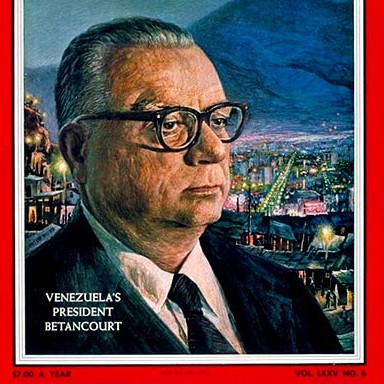He was president of Venezuela twice: Who is Romulo Betancourt?
The Father of Venezuelan Democracy: During Betancourt's presidency, a democratic constitution was drawn up and a reform program was put into effect to solve various social problems.

Venezuelan statesman. He worked for the establishment of democracy and economic development in Venezuela. He was born on February 22, 1908, in Miranda, Venezuela. He came from a middle-class family. While studying at the University of Caracas, he led student protest movements against the dictatorship of General Juan Vicerte Gomez. On April 6, 1928, the uprising failed, and Betancourt was arrested. He was released after several weeks in detention. He was exiled to Costa Rica for continuing the opposition. Here he joined the Communist Party. However, he left when the Communist Party of Costa Rica decided to join the III International.
Rómulo Ernesto Betancourt Bello (22 February 1908 – 28 September 1981), known as "The Father of Venezuelan Democracy", was the president of Venezuela, serving from 1945 to 1948 and again from 1959 to 1964, as well as leader of Acción Democrática, Venezuela's dominant political party in the 20th century.
He returned to his country after the death of the dictator Gomez in 1935. He pioneered the founding of the social justice Democratic National Party (Partido Democratico Nacional-PDN). He went into hiding for a time when the government of General Eleazar Lopez Contreras banned the party in mid-1937. He was captured in 1939 and exiled to Chile.
When Isaias Medina Angarita became president in 1941, he returned to his country. He founded the party called the Democratic Movement (Accion Democrâtica-AD), a successor to the PDN. The party became the strongest opposition movement against Isaias Medina. Upon the prohibition of the elections to be held in 1945, AD took power by making a coup with the support of young officers. Betancourt became president.
During Betancourt's presidency, a democratic constitution was drawn up and a reform program was put into effect to solve various social problems. State control over foreign oil companies was increased and an obligation to keep 50% of their profits at home was introduced. In order to accelerate industrial development, the Venezuelan Development Organization was established and the organization of workers and peasants was supported. An agrarian reform law was enacted and the peasants were given land.
In the general elections held in 1948, AD candidate Romulo Gallegos was elected president. A year later, Marcos Perez Jimenez delivered another coup, overthrowing Gallegos. Betancourt was again exiled. For ten years he traveled in the USA, Cuba, Puerto Rico, and Costa Rica. He organized the members of the banned AD abroad.
When Jimenez was overthrown in 1958, he returned to his country. He became the head of state with the elections held in December 1958. During the presidency, which lasted until 1963, the land was distributed to 50,000 families. The organized labor movement developed. Collective agreements became widespread. Companies opened to foreign competition through the Development Organization were supported.
Betancourt completed his term as president in 1963. In the elections held, AD candidate Raul Leoni was elected president. After independence, Betancourt was the first president in the history of Venezuela to take over the presidency by election after completing his term.
He went abroad in 1964. He lived in Switzerland until 1972. He wrote a book called El Petroleo de Venezuela (“Venezuela Oil”). He returned to Venezuela before the 1973 elections and supported the AD during the election campaign. The elections resulted in AD's victory and Carlos Andres Perez became president.
